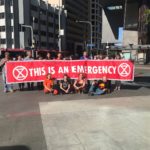Illegally Strip Searching Teens Does Not Amount to “Serious Misconduct”, LECC Finds

A 16-year-old First Nations boy was walking down the main street of a major town in north western NSW on 25 November 2018, when, on seeing some police, he dropped a foil of cannabis in his possession. The youth then picked it back up and stashed it in the front pocket of his boardshorts.
Having seen the boy’s reaction, NSW police sergeant MAI1 – as he was subsequently referred to – approached the teenager and explained that he’d seen him put something down the back of his shorts. The boy denied doing anything and told the officer he wasn’t wearing any underwear.
MAI1 told the teen’s two friends to “move on”. He then directed the boy to place his hands on a fence and proceeded to place his fingers inside the waistband of the youth’s shorts and pulled on it, so he could look inside. The sergeant was well aware at the time that this constituted a strip search.
The boy said the officer wasn’t allowed to look down his shorts. And as the sergeant continued on, the youth told him that he couldn’t stick his hands inside and his parents needed to be present for a strip search to take place. It was obvious to those gathered that the teen was under 18.
“Well, you actually don’t know the rules, we can search you,” countered MAI1, despite the fact that he wasn’t following police protocol. And the officer didn’t locate the cannabis, even though it was in the boy’s pocket.
At that point, constables MAI3 and MAI4 turned up in a caged truck. Officer MAI3 told the youth that he’d be getting his “gear off” down at the station, so they could locate the drugs.
A mounting issue
This illegal strip search and the one that followed became the focus of an investigation known as Operation Mainz conducted by the Law Enforcement Conduct Commission (LECC). And the state’s lone police oversight body released its findings on 8 May.
Operation Mainz is part of a wider strip search inquiry the LECC launched in late October 2018. It was prompted by “a number of specific complaints and anecdotal information from a variety of community organisations” about the way police had been conducting strip searches in NSW.
The LECC investigation was announced a few months after NSW Greens MLC David Shoebridge had released figures showing that the number of strip searches being carried out following a drug dog indication had recently doubled over a two year period.
This was followed by further revelations at the end of 2018 that showed the use of strip searches in this state had risen by 47 percent over the four years to June that year. And a report released by the Redfern Legal Centre last August revealed a twentyfold increase in strip search use since 2006.
Another illegal search
Operation Mainz included video footage of the 16-year-old Aboriginal boy being strip searched again in the vehicle dock at the police station. Although, the footage doesn’t capture the teenager removing the cannabis from his pocket while in the police van and dropping it on the floor.
The footage does show MAI1 ordering the handcuffed youth to place his hands on the wall. The officer then checks his pockets, pulls his shorts down, lifts up his shirt and then pushes upon the youth’s shoulder forcing him to squat. This all happens as officers MAI3 and MAI4 are standing by.
As the underage teen stands naked, MAI3 then conducts a thorough search of his shorts, while MAI1 walks over to the van and finds the cannabis inside it. MAI1 then goes back over to the boy – who’s still naked from the waist down – and questions him about the drugs for around 30 seconds.
The handcuffs are then removed from the boy’s wrists, he’s allowed to put his shorts back on, and then he and the officers enter the station through a door.
Multiple violations
NSW police strip search powers are contained in part 4 division 4 of the Law Enforcement (Powers and Responsibilities) Act 2002 (NSW). This legislation is popularly known as the LEPRA. And as the LECC found, the NSW police officers involved in these searches significantly breached these laws.
Section 31 of the LEPRA stipulates that if a strip search is to be conducted outside of a police station, “the seriousness and urgency of the circumstances” must make it necessary. But, this was hardly the case on the street, when the officer was already planning to take the boy back to the station.
During the two unlawful searches, the officers breached section 32 of the LEPRA in a number of ways. These included questioning the subject during the strip search and failing to provide him with “reasonable privacy”.
This section also maintains that a search must be carried out in the “least invasive” way. This was certainly not the case with this 16-year-old boy, as rather than rummaging around in his shorts, a simple pat down search on the roadside would have located the cannabis foil in his front pocket.
Section 33 of the LEPRA is a bit of a minefield when read in relation to these two unlawful strip searches. It provides that such a search must be conducted in a “private area”, and only in front of people that it is necessary are present for the purposes of the search.
If the person being strip searched is under 18 years of age, a parent or guardian must be present, as the 16-year-old boy correctly pointed out to the NSW police sergeant on the side of the road. And a strip search must not involve any touching of the subject’s body.
A lack of adequate training
The LECC found that the conduct of the police officers during the strip searches amounted to “unsatisfactory performance”. However, due to their lack of effective training – which has resulted in inadequate policing practices – it didn’t constitute serious misconduct.
“The current manner in which police are trained in their powers and responsibilities should be seriously reconsidered,” the report outlines, adding that the investigation demonstrated that any training methods being used aren’t “being universally applied in the practice of policing”.
And the Operation Mainz report recommends that local area commands begin holding compulsory sessions where officers are confronted with scenarios that can be encountered on the street and practical solutions as to how police should lawfully be operating can be workshopped.







